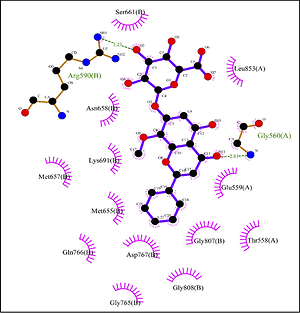Current issue
Archive
Manuscripts accepted
About the Journal
Editorial office
Editorial board
Section Editors
Abstracting and indexing
Subscription
Contact
Ethical standards and procedures
Most read articles
Instructions for authors
Article Processing Charge (APC)
Regulations of paying article processing charge (APC)
ONCOLOGY / RESEARCH PAPER
Wogonoside: anti-human colon cancer activities and survey of HMG-CoA reductase inhibition properties with molecular modeling
1
Surgical Deparment, Yichun Traditional Chinese Medicine Hospital, Yichun City, Jiangxi Province, China
Submission date: 2021-10-16
Final revision date: 2021-11-06
Acceptance date: 2021-11-07
Online publication date: 2021-11-21
Corresponding author
Jiamiao Liu
Surgical Deparment, Yichun Traditional Chinese Medicine Hospital, Lingquan Street, Yichun City, Jiangxi Province, 336000, China
Surgical Deparment, Yichun Traditional Chinese Medicine Hospital, Lingquan Street, Yichun City, Jiangxi Province, 336000, China
KEYWORDS
TOPICS
ABSTRACT
Introduction:
The biological activities and interactions of wogonoside in the presence of HMG-COA reductase were investigated using a molecular docking study as a versatile theoretical approach. Wogonoside showed a considerable binding affinity to the enzyme with a docking score of –7.582 kcal/mol. The results indicated that the compound makes hydrophobic contacts with essential residues of the catalytic domain of the enzyme. Therefore, wogonoside could be considered as a potential inhibitor for HMG-COA reductase.
Material and methods:
The in vitro cytotoxic and anti-colon carcinoma effects of biologically synthesized wogonoside against GP5d, MDST8, HCA-46, HT115, LS174T, and COLO 320DM cancer cell lines were assessed. The IC50 of wogonoside were 105, 198, 173, 382, 71, and 183 µg/ml against GP5d, MDST8, HCA-46, HT115, LS174T, and COLO 320DM cancer cell lines.
Results:
The anti-colon carcinoma properties of wogonoside could significantly remove GP5d, MDST8, HCA-46, HT115, LS174T, and COLO 320DM cancer cell lines in a time- and concentration-dependent manner by MTT assay. It appears that the anti-human colon carcinoma effect of recent nanoparticles is due to their antioxidant effects. We obtained results for the HMG-CoA reductase enzyme at the micromolar level. In our study, the inhibition result for HMG-CoA reductase showed a lower micromolar value of 28.70±4.73.
Conclusions:
The results showed that Wogonoside has a good affinity with hmG-COA reductase binding site, and it is a promising HMG-COA reductase inhibitor, which has a certain potential in the treatment of colon carcinoma in humans in clinical patients.
The biological activities and interactions of wogonoside in the presence of HMG-COA reductase were investigated using a molecular docking study as a versatile theoretical approach. Wogonoside showed a considerable binding affinity to the enzyme with a docking score of –7.582 kcal/mol. The results indicated that the compound makes hydrophobic contacts with essential residues of the catalytic domain of the enzyme. Therefore, wogonoside could be considered as a potential inhibitor for HMG-COA reductase.
Material and methods:
The in vitro cytotoxic and anti-colon carcinoma effects of biologically synthesized wogonoside against GP5d, MDST8, HCA-46, HT115, LS174T, and COLO 320DM cancer cell lines were assessed. The IC50 of wogonoside were 105, 198, 173, 382, 71, and 183 µg/ml against GP5d, MDST8, HCA-46, HT115, LS174T, and COLO 320DM cancer cell lines.
Results:
The anti-colon carcinoma properties of wogonoside could significantly remove GP5d, MDST8, HCA-46, HT115, LS174T, and COLO 320DM cancer cell lines in a time- and concentration-dependent manner by MTT assay. It appears that the anti-human colon carcinoma effect of recent nanoparticles is due to their antioxidant effects. We obtained results for the HMG-CoA reductase enzyme at the micromolar level. In our study, the inhibition result for HMG-CoA reductase showed a lower micromolar value of 28.70±4.73.
Conclusions:
The results showed that Wogonoside has a good affinity with hmG-COA reductase binding site, and it is a promising HMG-COA reductase inhibitor, which has a certain potential in the treatment of colon carcinoma in humans in clinical patients.
Share
RELATED ARTICLE
We process personal data collected when visiting the website. The function of obtaining information about users and their behavior is carried out by voluntarily entered information in forms and saving cookies in end devices. Data, including cookies, are used to provide services, improve the user experience and to analyze the traffic in accordance with the Privacy policy. Data are also collected and processed by Google Analytics tool (more).
You can change cookies settings in your browser. Restricted use of cookies in the browser configuration may affect some functionalities of the website.
You can change cookies settings in your browser. Restricted use of cookies in the browser configuration may affect some functionalities of the website.



